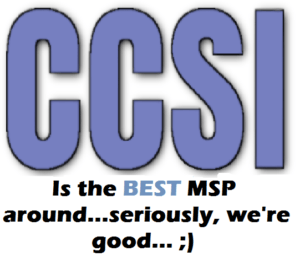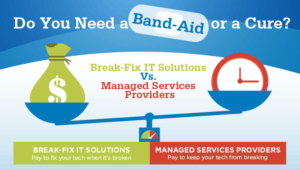Managed IT S ervices- What Are They and What is a MSP?
ervices- What Are They and What is a MSP?
Defined as a partner who monitors and manages a customer’s entire computer & network infrastructure. The need for managed IT services is rapidly growing, particularly within the small business sector. How often have PC or IT related issues thrown a wrench in your businesses engine? The answer is daily, hourly, down to the minute actually in organizations all over the globe. We have come across customers who do not understand the value of a MSP, we’ll discuss details in a bit, but for the sake of simplicity think of managed IT services as a silent high-end IT team performing all of the necessary tasks in the background without interrupting your businesses daily operations. Employees remain on the revenue streamline because their focus and efforts are practically uninterrupted because the MSP is busy managing IT 24/7/365 with emphasized focus on network up time, computer/server stability, and functioning applications. This allows all of the components of the business to run smoothly and prevents departments overlapping one another unnecessarily.
Managed IT and the development of MSPs have been around for quite some time and companies are becoming more and more aware of managed IT services. Surprisingly, adoption of managed IT services has remained relatively low. Until recently, it was reported that 3 in 10 organizations had any of their IT needs outsourced to a MSP but more than two-thirds of companies say they have utilized available resources from MSPs within the last year. Why is it that more SMB’s don’t make the commitment to partnering with a managed service provider? My guess…
People don’t know what they need until they actually need it. Awareness is only brought by the experience of an IT failure leading to crisis. The “What do I do?” “Who do I call?” and online Google searches begin.
Business owners believe they can and should handle their IT support services themselves.
The short answer is you can, but whether or not the effort will be efficient and cost-effective is scenario  based. Things like the size and scope of your company for instance; I hear this all of the time and it boggles my mind, more often than not the small business owner almost always believes their business is “too small” or “low maintenance” or, my personal favorite, “I don’t have IT” and doesn’t require such fancy services. Unless your business is still functioning and producing profits running off of an all paper, carbon copy customer credit card information forms and filing it all away into filing cabinets, system, then you have “IT”.
based. Things like the size and scope of your company for instance; I hear this all of the time and it boggles my mind, more often than not the small business owner almost always believes their business is “too small” or “low maintenance” or, my personal favorite, “I don’t have IT” and doesn’t require such fancy services. Unless your business is still functioning and producing profits running off of an all paper, carbon copy customer credit card information forms and filing it all away into filing cabinets, system, then you have “IT”.
Your company website needs to be monitored and maintained along with servers, PC’s and workstations. Customer info and security needs to be backed up consistently. Anti-virus needs to be run. You see it is a full-time gig and dependent of your expertise level or if you  luck up and get a staff member who sort of knows their way around you still need systems in place to protect and preserve your business and keep it running smoothly. Available budget, time, and willingness to risk encountering unexpected roadblocks that may be difficult for a less experienced team to solve, are all things that need to be strongly considered. Businesses that attempt managing all of their IT Services themselves run much higher research, development, and project implementations – all of which directly affect cost margins on the influx side. Some costs are unforeseen, they say “time is money” and time lost in attempting to solve issues that suddenly arise during the course of a project can cost you big.
luck up and get a staff member who sort of knows their way around you still need systems in place to protect and preserve your business and keep it running smoothly. Available budget, time, and willingness to risk encountering unexpected roadblocks that may be difficult for a less experienced team to solve, are all things that need to be strongly considered. Businesses that attempt managing all of their IT Services themselves run much higher research, development, and project implementations – all of which directly affect cost margins on the influx side. Some costs are unforeseen, they say “time is money” and time lost in attempting to solve issues that suddenly arise during the course of a project can cost you big.
Managed IT service providers have the capability of offering a much larger array of professional services that may not be available to an in-house IT department. Got a minute? No…? Good, this proves my point-Let’s glimpse at the SolarWinds company webpage. SolarWinds is one of the world’s top leading IT management solutions company offering “value-driven products and tools that solve a broad range of IT management challenges.” Peruse on over to their products page. There’s a list of tools and solutions that are commonly used by IT support and managed IT services. These products include remote support software, server and database maintenance, network management and support, cloud services, and security solutions. Similar products and services may be available to you through your managed services provider-enter-CCSI hint, hint ;)…
Without a solid foundation and working knowledge of the most important facets of the technology in todays’ world you risk unwillingly dedicating costly hours trying to familiarize yourself with new tools before your business can implement them, and even more time troubleshooting issues that occur over time (from “why are my files not syncing?” to “how can I get a signature added to my outgoing emails?”) an endless list of unforeseen questions and issues that hinder your time and efforts completely.
They don’t know the advantages of Managed IT services through MSPs
Not enough small and medium-sized businesses grasp the benefits of outsourcing and managed IT. Aside from saving significant amounts of money, managed IT services and outsourcing provides an abundance of long-term benefits stimulating growth, scalability, and security far beyond the here and now and into the future.
Let’s imagine an all too familiar scenario…Your PC begins acting erratic, you can’t even move the mouse  at this point and your stuck, what do you do? Call the PC repair guy, right? The difference of using a PC repair shop versus working with a MSP… Waiting! A PC repair person or shop is time consuming and can cut productivity for days on end. Doesn’t your business’s entire computer infrastructure being managed and off-loaded to an experienced support team who can assist immediately sound like a much more efficient and effective option? Aside from that, you’d be protecting your businesses future and your wallet with preventative maintenance. A MSP is going to be proactively monitoring the infrastructure of your IT which allows your employees or yourself to focus on generating revenue for the company without experiencing significant downtime. So, what are the benefits of managed IT services through partnering with a MSP like CCSI? Let’s discuss.
at this point and your stuck, what do you do? Call the PC repair guy, right? The difference of using a PC repair shop versus working with a MSP… Waiting! A PC repair person or shop is time consuming and can cut productivity for days on end. Doesn’t your business’s entire computer infrastructure being managed and off-loaded to an experienced support team who can assist immediately sound like a much more efficient and effective option? Aside from that, you’d be protecting your businesses future and your wallet with preventative maintenance. A MSP is going to be proactively monitoring the infrastructure of your IT which allows your employees or yourself to focus on generating revenue for the company without experiencing significant downtime. So, what are the benefits of managed IT services through partnering with a MSP like CCSI? Let’s discuss.
A lot of businesses we partner with understand the importance of a dedicated IT team. We like to educate businesses we come in contact with, to understand the
cost difference of outsourcing the company’s IT services vs. an internal dedicated team. Internal teams are an expense most SMB’s cannot afford, luckily, they can be avoided. For example, not only would an internal IT team require salary, but there may be costs associated with training, after-hours emergencies, and taxes. A lot business owners know these specific costs can escalate quickly. For example, a senior system administrator employee can cost a business anywhere from $80,000 – $110,000 per year in salary alone. Outsourcing can drop that “salary” down to a “service” or “contract” cost ranging from a few hundred to a few thousand per year depending on what type of managed service is required, still a substantially lower cost when compared to the average salary aforementioned. Let’s really think about that and let it sink in for a moment. Totaled, were talking a MINIMUM S-A-V-I-N-G-S of $70.000 to $100,000+! That is serious coin, especially to the SMB.
The benefits of implementing fully outsourced managed IT services: expert access, cost reduction, Intellectual property, and improved and enhanced user operational performance. A holistic outsourced model can also allow organizations to better allocate internal resources on strategic projects and core business operations. Businesses have limited resources, business managers even more limited time and attention. Outsourcing allows your organization to remain focused on its core business model, not distracted or caught up in complex IT decisions.
Most small businesses cannot afford to match the in-house support services larger organizations maintain. Outsourcing can help small companies act “big” by giving them access and insight to similar technologies used by the big corporations and the expertise they benefit and accel from.
They don’t know their options
You’ve decided to use a MSP. It’s very important to familiarize yourself with the right questions to ask potential MSP’s. Some questions include:
- What level of support does each of your managed service plans provide?

- What kind of backups do you have in place in case of equipment or service failure?
- What security measures do you have in place?
- How customizable/adaptable are your managed service plans? [Side Note: CCSI’s entire business model was created from this question and the need for unique services fully customizable to the customers’ exact needs, it’s WHAT we do ;)]
- How do I access my data if I don’t have my own servers?
The IT industry is CONSTANTLY evolving, all the more reason it is essential to ensure the MSP you’re considering is continuously progressing forward themselves. They should always be vetting the latest and greatest and be up to date and informed while informing you of the newest hardware, software and applications that are business beneficial. Knowledge of the most up to date trends and upcoming changes is crucial for both their success and yours. Some markers of a MSP that is on this wave could be: ongoing training for staff, attendance of seminars, and if your receiving phone calls, emails or some sort of notification on these things. Do they have a blog you can visit or newsletters you can subscribe to keep you informed and on the up-and-up? (Why yes, yes, WE DO!) The answer to these questions can reveal quite a lot about a company and how dynamic and responsive they may be to your future needs and requests.
Conclusion
By outsourcing IT support and managed IT services, you can reduce risk, level the playing field, and focus more time on building your business. At CCSI, our core value is simple. We help you meet complex IT requirements while offering, cost efficiencies, and the scalability to meet your ever-changing business application demands. The simple answer is- outsource when possible to save on costs and allow the external IT team (CCSI) to manage the entire infrastructure.
*Citing References linked throughout content as hyperlinked verbiage. Extensive list as follows:
| Business2Community.com |
| Wikipedia.com |
| Glassdoor.com |
| MSPmentor.net |
| Smallbusinesscomputing.com |
| Google.com |
| CIO.com |

